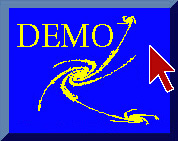|
The use of computer technology to aid in
education is rapidly becoming ubiquitous in classrooms.
Since the introduction of personal computers in 1977,
the market for educational software has grown very quickly.
The latest "edutainment" packages are compelling,
colorful, dynamic and musical, but often sport more glitz
than grammar. Educators and parents are overwhelmed by the
range of products available.
Yet despite this vast and varied market,
the predominant paradigm involves one student sitting
at one computer using one program - alone.
Today, many schools are being "wired",
giving teachers and students direct access to the Internet.
The most common use of the World-Wide Web in schools is
"surfing" sites (typically pre-screened by
parents, teachers and media specialists)
to collect information for research projects.
In the
DEMO Lab
at
Brandeis University's
Computer Science Department,
we have been studying communities of artificial
learners (systems that simulate human learning on
computers), trying to identify the features of learning
environments that promote learning.
One result we (and others) have found is that pairing
learners appropriately, to engage in collaborative
tasks, often speeds the learning process and motivates
learners to continue participating.
We see the Internet as a means for students to
work on computers collaboratively, breaking the mold of
typical educational software systems.
As such, we are building a virtual community of
learners, where participants
engage in multi-user activities.
The anonymity of the Internet allows us to create
learning partnerships between students based on their
skill levels, rather than their ages or common locations.
For example, a gifted third grader and a below-average
tenth grader can be paired effectively,
without embarrassment,
without either knowing the age or true identity
of the other.
|
Of utmost concern to us (also parents of public
primary school children), are issues of safety and privacy.
Our system is unique in that users only interact
indirectly, through a technology called
software agents (small computer programs that - in
this case - mediate communication between two users).
There is no chat room;
there is no direct communication of any kind.
Users provide login names (which should be aliases) that
allow us to maintain their individualized student models,
but are identified to other users only by 2-dimensional
icons that they create themselves (using a tool
like the KidPix stamp editor).
Our project, called
CEL
(Community of
Evolving
Learners),
is an Internet-based system where students
engage in two-player educational games.
These games are straightforward (i.e. there is no glitz)
and provide practise at basic skills
(e.g. spelling, typing, arithmetic, geography).
This is a research-oriented project with many goals.
First and foremost, we hope to demonstrate that the Internet
can be used to enable a virtual learning community,
where learners in disparate locations can come together and
help each other advance. Second, the computer allows us to
monitor students' activities and build a comprehensive model
of a student's abilities. This student model can be
provided to teachers as not only a picture of a student's
strengths and weaknesses but also a database of skills that
each student has been exposed to, whether or not s/he has
mastered those skills. Additionally, we can use this model
computationally to determine appropriate pairings of
students while they are using the system.
Finally, we can use a student model to select individualized
problems for each user, based on his/her past interactions
with the system.
|
